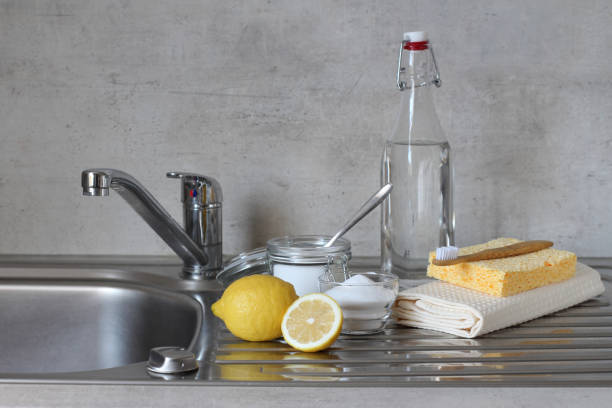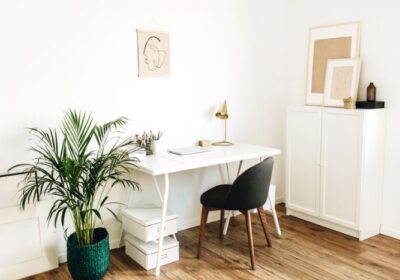What Are Tips for DIY Home Cleaning Remedies?

Vinegar
Distilled white vinegar, which is made by fermenting a mixture of about 5 to 10 percent acetic acid with 90 to 95 percent water, can be used for a variety of purposes. It’s one of the most versatile types of vinegar, and its flavor profile can be incredibly varied depending on its source, including wine, rice, barley, apple cider, and various fruits and herbs.
It can be diluted to make a wide range of liquid cleaners that clean smooth surfaces like countertops, appliances, glass, and tile. It can also be made into pastes and scrubs to deal with more abrasive messes.
Vinegar is also an excellent cleaner for removing stubborn stains and grime from things like sinks, showers, tubs, and toilet bowls. Just spray it on the stain, let it sit for a few minutes, and wipe away with a damp sponge or cloth.
You can also use undiluted vinegar to remove soap scum and mineral deposits from your shower and tub. Just pour it straight from the jug into a spray bottle and spritz the affected areas. Wipe them down with a damp towel or sponge, and then wash the rest of the surface with warm water.
As a general rule, you should avoid using vinegar around natural stone and wood, because it can discolor these surfaces. For example, a full-strength vinegar solution can etch a marble countertop or dull the finish on a hardwood floor.
Salt
Salt is a great addition to any DIY cleaning toolkit and can be used in a variety of ways. It can help keep your house germ-free, repel insects, and remove stains from various surfaces.
It can also help dehumidify your home as it absorbs moisture from the air. Simply fill a bottle with breathable bags of salt and keep it in areas where there is a lot of moisture in the air.
Another advantage of salt is that it can easily scrub away baked-on grease or rust on kitchen appliances, including oven racks and stove grates. You can also use it as a paste to remove hard-water stains on countertops.
Baking soda and salt are a pair of natural ingredients that can be mixed together to make an easy all-purpose cleaner. The baking soda will make it mildly abrasive, while the salt will help absorb and neutralize odors without scratching surfaces.
Using these natural cleaners can save you money and create a healthier, greener cleaning routine for your home. They are also a safer alternative to many common cleaning products on the market today. Moreover, you will be able to use the ingredients that are already in your pantry or cleaning closet! Try one of these easy, DIY cleaning solutions and watch your home come alive with a new shine! Have a great day! Thanks for reading! Stay tuned for more DIY home cleaning tips and tricks on the blog.
Olive Oil
There are lots of health benefits to using olive oil in your home, from cleaning to beauty and more. It also has a nourishing, anti-aging effect on skin and hair. It’s a must-have in your DIY home cleaning kit.
For instance, you can use a spray bottle filled with olive oil to clean your gardening tools to prevent them from rusting. And you can lubricate squeaky hinges with a dribble of olive oil to keep them quiet and help them move smoothly.
You can also use it to polish kitchen cabinets and leather furniture. Just add a little olive oil to a spray bottle with water and wipe down.
Stainless steel appliances are notoriously hard to polish, but olive oil can do wonders for your stainless-steel fridge and oven doors. Plus, it protects the finish from stains and scratches.
Another great use for olive oil is to clean and polish wood floors. You can also use it to remove tree sap or tar spots from floors by combining a half-cup of olive oil with two tablespoons of baking soda and rubbing the spot with a dry cloth.
You can also use olive oil to remove sticky residue from glass surfaces like windows and mirrors. Simply apply a bit of oil to the glass, rub firmly, and then rinse with warm water.
Castile Soap
Castile soap is one of the most gentle, non-irritating and hydrating cleansers on the market. It’s also a great choice for people with sensitive skin, as it won’t strip the natural oils from your body and will leave your skin feeling moisturized.
It’s also biodegradable and vegan-friendly, so it’s a better alternative to conventional soaps that use tallow (animal fat). This soap is easy to find in your local grocery store or health food store.
A little bit goes a long way, so you can save money by reducing the amount of commercial cleaners you use. For example, if you regularly hand-wash your dishes, replace your detergent with a diluted castile soap mixture (1:10). You can also add a little to your mop water for an extra-smooth finish, or spray it on your kitchen counters before scrubbing to make them shine.
If you have dogs, you can wash their fur with a squirt of diluted soap in a bowl or sink full of water. This will help remove odors and dirt from the fur.
You can also create a special spray that can deter bugs from your houseplants by mixing 1 tablespoon of soap with 1 quart water and spraying it on the leaves. You can even add a few drops of essential oil for a pleasant scent.
You can also use it to give your toilet a fresh, clean feel. To do this, just squirt some into the toilet, let it sit for a few minutes, and then scrub it clean.
Furniture Polish
Furniture polish is a safe and inexpensive way to keep your wood surfaces looking their best. It’s also a great option for those who want to use natural ingredients when they clean their homes.
A quick spray of a homemade furniture polish will remove dirt and smudges from wood, while the oils will moisturize and shine it. Unlike many commercial products, this homemade recipe is easy to make and doesn’t contain any synthetic chemicals.
Another benefit of this homemade furniture polish is that it contains lemon essential oil, which makes it a natural degreaser and prevents buildup on the wood surface. You can also substitute orange essential oil, which has an uplifting and pleasant scent.
Using a lint-free cloth to dust and polish furniture will help ensure you don’t leave any lint behind. Old t-shirts or flannel baby diapers work well for this task, and you can use the same cloth multiple times without worrying about leaving a clump of lint in your polishing or dusting solution.
A good rule of thumb is to avoid spraying, squirting or pouring furniture polish directly on your wood surfaces. This can lead to uneven distribution and overspray on non-wood surfaces, such as glass, leather or stainless steel.
Floor Cleaner
Floors are a major source of dirt and grime in homes. It’s important to clean floors regularly, especially when children or pets are present. Otherwise, your floors will collect more grime and make it harder to wipe down.
You can find a wide variety of different floor cleaners in the market. Some of them are multi-purpose, while others are specifically designed to work with a particular type of flooring material.
The best types of homemade floor cleaners are made with natural ingredients. They typically contain organically-occurring cleaning agents like vinegar. They also avoid artificial colors and scents.
These products are safe to use on multiple kinds of floor surfaces and can be used in areas that may be occupied by kids or pets. They’re also easy to apply, so they save you time and space.
If you’re looking for a more natural floor cleaner, try one that’s made with vegetable oil. It has disinfectant properties and can help to protect wood surfaces.
Aside from the oil, you’ll need distilled water to make this DIY cleaner. It will help to dissolve the dirt and remove the grease.
Before using a cleaner on your floor, you should test it in an inconspicuous area first to make sure it doesn’t cause any discoloration. You should also check to see if your tile or grout sealant is compatible with the cleaner. This will help you avoid any unforeseen problems when using your DIY home cleaning remedies.










